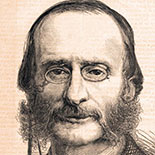 Jacques Offenbach (June 20, 1819 – October 5, 1880) was a German-born French composer, cellist and impresario of the romantic period.
Jacques Offenbach (June 20, 1819 – October 5, 1880) was a German-born French composer, cellist and impresario of the romantic period.
He is remembered for his nearly 100 operettas of the 1850s–1870s and his uncompleted opera The Tales of Hoffmann. He was a powerful influence on later composers of the operetta genre, particularly Johann Strauss, Jr. and Arthur Sullivan. His best-known works were continually revived during the 20th century, and many of his operettas continue to be staged in the 21st. The Tales of Hoffman remains part of the standard opera repertory.
Offenbach became associated with the Second French Empire of Napoleon III; the emperor and his court were genially satirized in many of Offenbach’s operettas. Napoleon III personally granted him French citizenship and the Légion d’Honneur. With the outbreak of the Franco-Prussian War in 1870, Offenbach found himself out of favor in Paris because of his imperial connections and his German birth. He remained successful in Vienna and London, however. He re-established himself in Paris during the 1870s, with revivals of some of his earlier favorites and a series of new works, and undertook a popular U.S. tour. In his last years he strove to finish The Tales of Hoffmann, but died before the premiere of the opera, which has entered the standard repertory in versions completed or edited by other musicians.